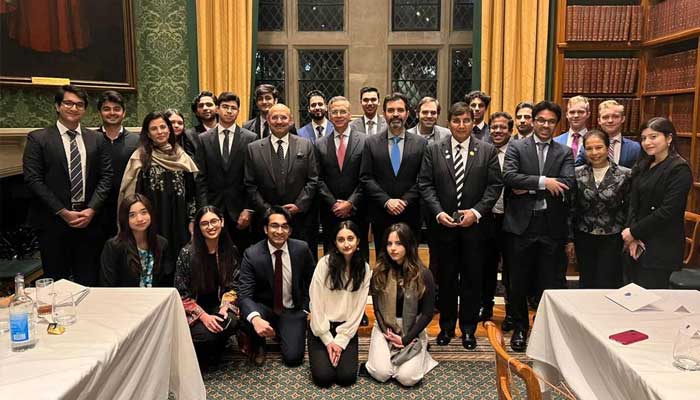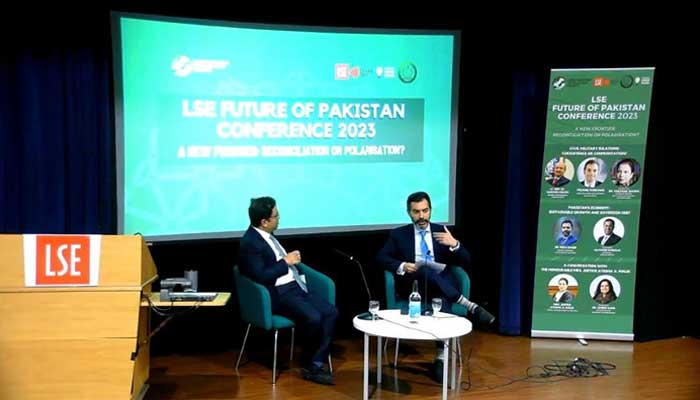Ex-SBP chief says Pakistanis need to get rid of conspiracy theories
LONDON: Former Governor State Bank Reza Baqir has said that Pakistan needs to get rid of the conspiracy myths and theories and engage with the contextual reality to move forward.
The former SBP governor singled out three myths that plague Pakistani policy and discourse. He was speaking at one of the sessions here at the Future of Pakistan Conference 2023 — hosted by the student union of the London School of Economics (LSE).
Other speakers at the various sessions included Michal Kugelman, General (retired) Haroon Aslam, Farzana Shaikh (moderator), Dr Amber Daar (moderator), Ali Farid Khawaja (moderator) and Mrs Justice Ayesha Malik.
Reza Baqir singled out three “myths” that plague Pakistan’s progression that civilians must recognise as falsehoods: there is a larger conspiracy against Pakistan that hinders our progression; international institutions such as the IMF are to be blamed for Pakistan’s problems; and Pakistan is a unique country and our problems are peculiar. Reza Baqir said that our neighbouring countries have debts that are higher but also higher GDPs.
Exemplifying that, higher debts don’t mean that a country cannot grow. He said that debt by itself is not always a problem, there are countries with higher debt than Pakistan but the problem is where the debt currency is foreign and if it’s taken by govts themselves, then the money is going to go out from reserves and for that you have to let your exchange rates float freely and not try to fix the free-floating rates.
Pakistani scholar Dr Farzana Sheikh told the conference that Pakistan has been in a state of turmoil with the confluence of political, economic, floods and terrorism problems ever since the success of Vote of No Confidence (VNC) against Imran Khan in April last year.
She said that the military is criticised for putting Khan in power in the first place adversely, Imran Khan has accused the military of causing his government’s collapse through a so-called US-led conspiracy.
General (retired) Haroon Aslam said that the law of necessity was specialised in Pakistan in the form of military interventions that led to Pakistan being called a military state.
He said that the military is blamed for most of the problems of Pakistan but the fact is that the military has not asked the civilian administration and bureaucrats not to carry out their jobs.
When asked about the Doctrine of Necessity, Michael Kugelman said that Pakistan needs to get rid of the doctrine of necessity if it wants to progress further. He stated that Pakistan has not been a democracy for much of its existence as unelected forces impose their will on elected forces; dissidents and critics of this such as journalists then suffer consequences.
In conversation with Dr. Amber Darr, Mrs. Justice Ayesha Malik recounted the challenges and opportunities she faced in her personal journey as a female in the legal profession and as a member of the superior judiciary.
She also discussed a number of her judgments in which she had interpreted the law for the benefit of women (such as the Sadaf Aziz case) and children caught in a custody battle (Raja Muhammad Owais v. Nazia Jabeen).
-
 Fresh Details Of King Charles, Queen Camilla's US Visit Emerge Amid Andrew Investigation
Fresh Details Of King Charles, Queen Camilla's US Visit Emerge Amid Andrew Investigation -
 Iran 'set To Buy' Chinese Carrier-killer Missiles As US Forces Gather In Region
Iran 'set To Buy' Chinese Carrier-killer Missiles As US Forces Gather In Region -
 Prince Harry And Meghan Unlikely To Meet Royals In Jordan
Prince Harry And Meghan Unlikely To Meet Royals In Jordan -
 Hero Fiennes Tiffin Shares Life-changing Advice He Received From Henry Cavill
Hero Fiennes Tiffin Shares Life-changing Advice He Received From Henry Cavill -
 Savannah Guthrie's Fans Receive Disappointing News
Savannah Guthrie's Fans Receive Disappointing News -
 Prince William Steps Out For First Solo Outing After Andrew's Arrest
Prince William Steps Out For First Solo Outing After Andrew's Arrest -
 Jake Paul Chooses Silence As Van Damme Once Again Challenges Him To Fight
Jake Paul Chooses Silence As Van Damme Once Again Challenges Him To Fight -
 Google Disrupts Chinese-linked Hacking Groups Behind Global Cyber Attacks
Google Disrupts Chinese-linked Hacking Groups Behind Global Cyber Attacks -
 Four People Killed In Stabbing Rampage At Washington Home
Four People Killed In Stabbing Rampage At Washington Home -
 Meghan Pushes Prince Harry Into Territory That’s Dangerous To His Brand: ‘She Isn’t Hearing A Word Of It’
Meghan Pushes Prince Harry Into Territory That’s Dangerous To His Brand: ‘She Isn’t Hearing A Word Of It’ -
 Christina Applegate Reflects On Lasting Impact Of Being Molested In Childhood
Christina Applegate Reflects On Lasting Impact Of Being Molested In Childhood -
 Martin Short Makes Big Decision Following Tragic Death Of Daughter
Martin Short Makes Big Decision Following Tragic Death Of Daughter -
 Antarctica’s Mysterious ‘gravity Hole’: What’s Behind The Evolution Of Earth’s Deep Interior?
Antarctica’s Mysterious ‘gravity Hole’: What’s Behind The Evolution Of Earth’s Deep Interior? -
 Hilary Duff Addresses Ashley Tisdale's 'toxic Mom Group' Claims And Matthew Koma's Firey Response
Hilary Duff Addresses Ashley Tisdale's 'toxic Mom Group' Claims And Matthew Koma's Firey Response -
 Jack Hughes's Proximity To Trump Angers Tate McRae Fans
Jack Hughes's Proximity To Trump Angers Tate McRae Fans -
 Neve Campbell Opens Up About Her 'difficult Decision' To Not Sign 'Scream 6'
Neve Campbell Opens Up About Her 'difficult Decision' To Not Sign 'Scream 6'





